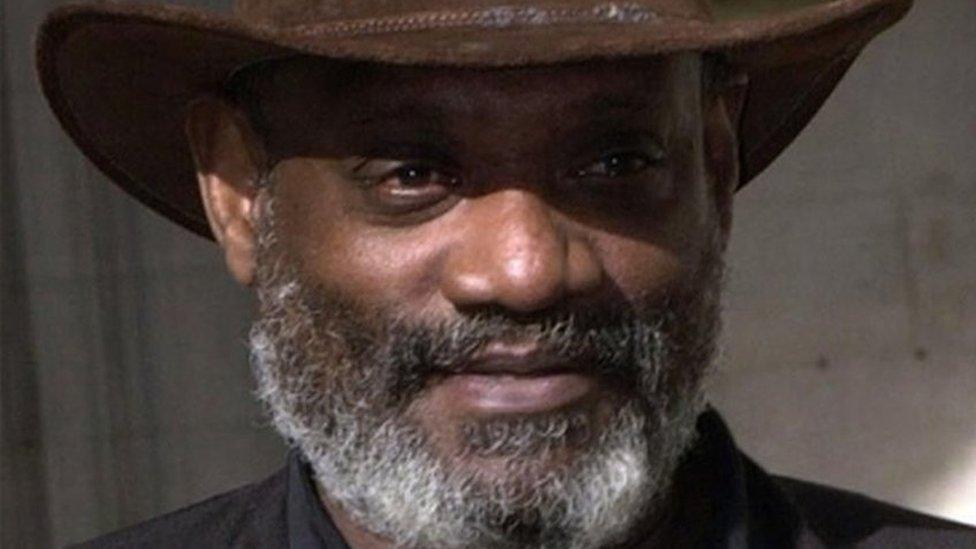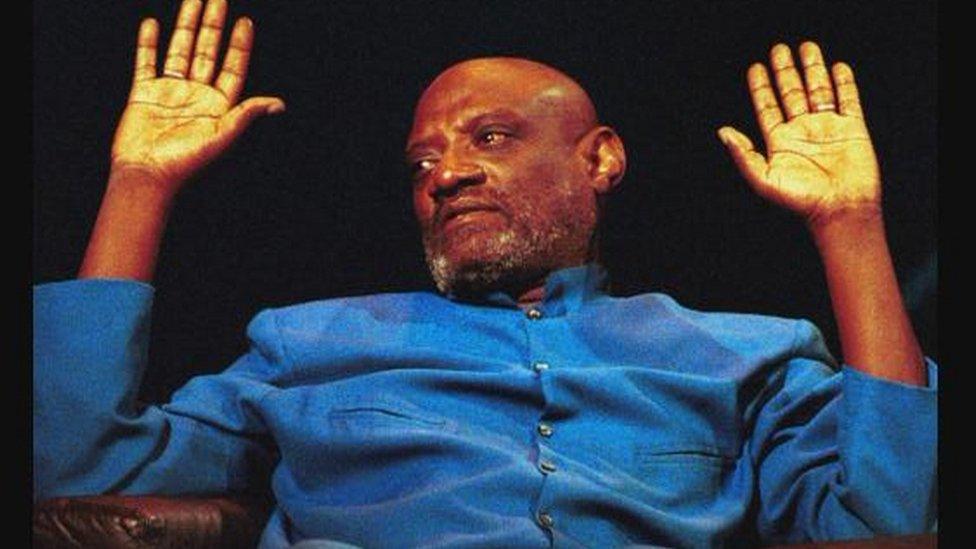Civil rights activist Darcus Howe dies aged 74
- Published

Civil rights activist Darcus Howe has died aged 74, his biographer has said.
The writer and broadcaster campaigned for black rights for more than 50 years and organised the 1981 Black People's March after the New Cross fire in which 13 black teenagers died.
His biographer Robin Bunce said Mr Howe "died peacefully in his sleep" at his Streatham home on Saturday and that his wife Leila Hassan confirmed the news.
In 2009, Mr Howe wrote in The Guardian, external about his prostate cancer diagnosis.
"Long live the NHS", he wrote, after describing how his treatment had been successful following the 2007 diagnosis.
Mr Howe was born on 26 February 1943 in Trinidad, where his father was a vicar and his mother a teacher.
He came to the UK in 1961.
Mr Howe, who lived in Brixton for more than 30 years, started his journalism career with the magazine Race Today, where he was editor for 11 years, and more recently he was a Voice Newspaper columnist.
He made his name in the British Black Panthers, successfully challenging racism in the police during the Mangrove Nine trial at the Old Bailey in the early 1970s.
As a journalist he contributed to a wide range of newspapers and had a regular column in the left-wing New Statesman magazine.
He began his broadcasting career in the 1980s, presenting shows for the BBC, LWT and Channel 4.
In 2003 he wrote and presented the controversial series White Tribe, which explored the idea of Englishness and involved travelling around the country.
The campaigner also spoke out after the London riots in the summer of 2011, which were sparked by the shooting of Mark Duggan.
'Great loss'
Mr Bunce told the BBC that Mr Howe was "an outstanding black activist" and a "powerful voice for black rights in Britain".
"He took on the Metropolitan Police, the Home Office and Special Branch in a 55-day trial as one of the Mangrove Nine," he said.
"Taking on the police in the 70s at a time of enormous police racism and police corruption was an incredibly courageous thing to do.
"He was able to turn the table on his accusers and he was able to win his case.
"And not only was he able to win his own freedom, but he was able to expose police racism and force the first official acknowledgement of institutional racism in the United Kingdom as a result of that case."
Poet and friend Linton Kwesi Johnson told the BBC: "Darcus was a fearless warrior in the struggle against racial injustice in this country."

The writer and broadcaster, 74, campaigned for black rights
Friend and writer Farrukh Dhondy, a former commissioning editor at Channel 4, told the BBC that Mr Howe was "one of the bravest, one of the most courageous, and one of the most significant activists for black people's rights in this country".
He was a "very modest leader who would speak directly to the people," Mr Dhondy said.
Tributes are also being paid to Mr Howe on social media.
The Voice News tweeted, external: We regret to inform you that respected journalist, activist & former @TheVoiceNews columnist #DarcusHowe has died. May he rest in peace.
Shadow home secretary Diane Abbott tweeted, external: "So sad to hear that Darcus Howe has passed away. One of the standout activists & public intellectuals of his generation."
Film maker Amma Asante tweeted, external: "May u RIP Darcus Howe. British #BlackPanther & a pioneer in the fight for #equality in UK. I enjoyed our last talk immensely & learned much."
Labour MP Helen Hayes tweeted, external: "Sad to hear of the passing of Darcus Howe, great loss to Brixton & to the cause of equality and human rights RIP."
Playwright Bonnie Greer tweeted, external: "First person I was told to meet when I arrived here 30 years ago was RIP #DarcusHowe. Always supportive; optimistic."
Journalist Jesse Bernard tweeted, external: "Will always be grateful for the work Darcus Howe did."
London Assembly member Florence Eshalomi tweeted, external: "Sad to hear of #DarcusHowe passing. May his soul rest in peace."